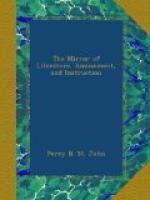* * * * *
STREET SYMPATHIES.
During “the season” the veriest stranger who has an eye and ear, and thoughts, must find in London sufficient to occupy his attention; true, he may start and sigh, to think that of the busy and enormous multitude around him, not one would care, if, treading on yonder bit of orange peel, he should slip off the flagway, and falling beneath the wheel of that immense coal-wagon, have his thigh crushed to atoms, while you’d be saying “Jack Robinson.” But if he do sigh, the more fool he; first, because “grieving’s a folly,” as the old sea song hath it; next because he is mistaken in supposing that no one would feel interested in his misfortune. There are two upon the very flagway with him, who would evince the greatest sympathy in his fate; the one is a surgeon’s apprentice, who, with anxious care, would bear him off to his hospital, that he might “try his ’prentice hand” to doctor him while living, and dissect him when dead; and the other is a running reporter to one of the morning papers, who would with gentle and soothing accents inquire his name, condition, and abode, to swell the paragraph, and increase his pay.—Blackwood’s Magazine.
* * * * *
LINES TO EDWARD LYTTON BULWER, ON THE BIRTH OF HIS CHILD.
My heart is with you, Bulwer, and portrays
The blessings of your first paternal days;
To clasp the pledge of purest, holiest
faith,
To taste one’s own and love-born
infant’s breath,
I know, nor would for worlds forget the
bliss.
I’ve felt that to a father’s
heart that kiss,
As o’er its little lips you smile
and cling,
Has fragrance which Arabia could not bring.
Such are the joys, ill mock’d in
ribald song,
In thought, ev’n fresh’ning
life our life-time long,
That give our souls on earth a heaven-drawn
bloom;
Without them we are weeds upon a tomb.
Joy be to thee, and her whose lot with
thine,
Propitious stars saw Truth and Passion
twine!
Joy be to her who in your rising name
Feels Love’s bower brighten’d
by the beams of Fame!
I lack’d a father’s claim
to her—but knew
Regard for her young years so pure and
true,
That, when she at the altar stood your
bride,
A sire could scarce have felt more sire-like
pride.
T. Campbell.
* * * * *




